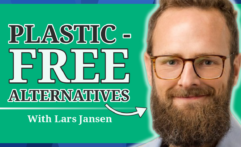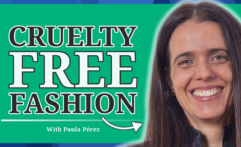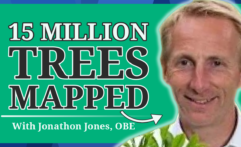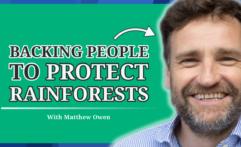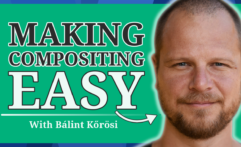How to Instill a Love of Nature in Kids: Vikas Narula from Neighborhood Forest (#10)
Affiliate Disclosure
Hey fellow impactful ninja ?
You may have noticed that Impactful Ninja is all about providing helpful information to make a positive impact on the world and society. And that we love to link back to where we found all the information for each of our posts.
Most of these links are informational-based for you to check out their primary sources with one click.
But some of these links are so-called "affiliate links" to products that we recommend.
Why do we add these product links?
First and foremost, because we believe that they add value to you. For example, when we wrote a post about the environmental impact of long showers, we came across an EPA recommendation to use WaterSense showerheads. So we linked to where you can find them. Or, for many of our posts, we also link to our favorite books on that topic so that you can get a much more holistic overview than one single blog post could provide.
And when there is an affiliate program for these products, we sign up for it. For example, as Amazon Associates, we earn from qualifying purchases.
What do these affiliate links mean for you?
First, and most importantly, we still only recommend products that we believe add value for you.
When you buy something through one of our affiliate links, we may earn a small commission - but at no additional costs to you.
And when you buy something through a link that is not an affiliate link, we won’t receive any commission but we’ll still be happy to have helped you.
What do these affiliate links mean for us?
When we find products that we believe add value to you and the seller has an affiliate program, we sign up for it.
When you buy something through one of our affiliate links, we may earn a small commission (at no extra costs to you).
And at this point in time, all money is reinvested in sharing the most helpful content with you. This includes all operating costs for running this site and the content creation itself.
What does this mean for me personally?
You may have noticed by the way Impactful Ninja is operated that money is not the driving factor behind it. It is a passion project of mine and I love to share helpful information with you to make a positive impact on the world and society. However, it's a project in that I invest a lot of time and also quite some money.
Eventually, my dream is to one day turn this passion project into my full-time job and provide even more helpful information. But that's still a long time to go.
Stay impactful,

Have you ever wondered what would be the easiest way to make our neighborhoods greener and at the same time instill a love of nature in our kids? Then you’ll really enjoy our conversation with Vikas Narula, the founder of Neighborhood Forest.
“We’ve given away over 130,000 trees in our last 14 years, but over 100,000 of those trees have been given out just in the last few years since that tipping point. And we’re on track to reach a 1,000,000 children within the next 3 to 5 years. And our goal is to reach every child in America, in North America, and eventually the world.“
Vikas Narula, Neighborhood Forest
Three Key Points From This Episode
Vikas will share how being bedridden for one month helped him rediscover his joy for trees…
How his mindset and the program shifted after he saw the impact they had with giving kids trees…
How his work with Neighborhood Forest helped him adopt a life purpose of giving…
About Vikas Narula
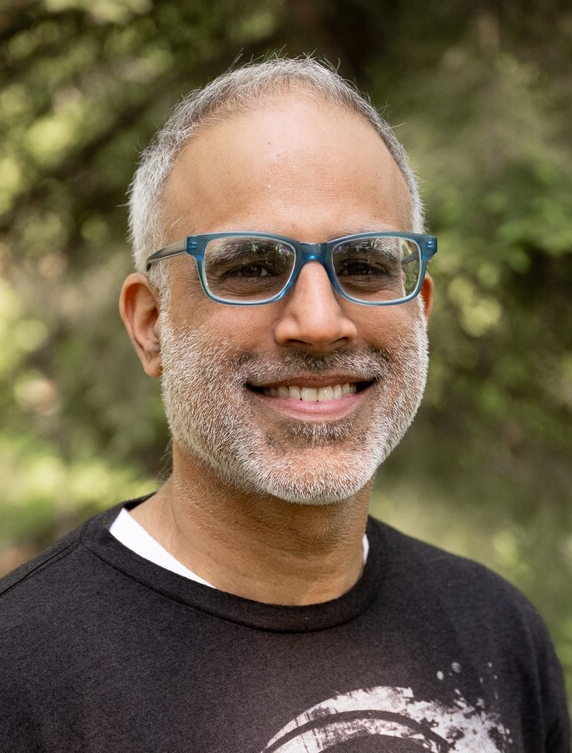
Vikas loves trees – planting them and watching them grow. After experiencing the joy of planting little seedlings in college and seeing them grow up into majestic giants over decades, he decided that he wanted to give every child this joy. And, in the process, beautify neighborhoods, remove carbon from the atmosphere, and help instill in the hearts of all impacted kids a sense of magic, wonder, and love for our planet. In 2010, he co-founded Neighborhood Forest to turn his passion into his profession.
About Neighborhood Forest
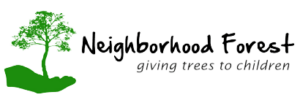
Neighborhood Forest is a non-profit social venture dedicated to giving children their very own tree to plant – for free – every Earth Day. What started with 4 schools in Minneapolis has grown to over 1,500 schools, libraries, and youth groups in 48 states across America and Canada. Their goal is to reach every child in North America and, eventually, the world.
Links and Additional Information Discussed
You can find out more about Neighborhood Forest and their tree planting mission on their official website
Follow their journey on their social channels: Facebook, LinkedIn, Instagram, and YouTube
Find out more about how you can get free trees for your institution or help Neighborhood Forest grow
The Full Transcript
Dennis: Hello, and welcome to the Impactful Ninja Show. I’m your host, Dennis Kamprad, and today we’re joined by Vikas Narula from Neighbourhood Forests. Vikas, welcome.
Vikas: Thank you so much, Dennis. Lovely to be here.
Dennis: Thanks. It’s it’s a pleasure, well, having you as well as one of the our early partners. But Let’s get into that later. Before we start in telling your, your journey as well, give us a brief overview. What is Neighbourhood Forest, and what are you doing there?
Vikas: Yes. So Neighborhood Forests is a nonprofit. And very simply, we give free trees to kids every Earth Day. And we do this because we want to instill Still in the hearts of our little children, a sense of magic, wonder, and love for the planet. We want to beautify our neighborhoods and reduce our carbon footprint.
Dennis: I love it. Thank you. And to already kind of take away a little bit from the from the partnering perspective as well. Like, one thing that I really, really enjoyed is the Decentralization of kind of greening the environment plus helping helping kids become ambassadors for nature as well when they’re growing up with the trees.
Vikas: Yeah. That’s what it’s about. It’s it’s about the the child and the tree forming a bond, them learning how to care for a piece of life, And then, yeah, them growing up together. And we, as you’ve seen, have a growing library of these visual Stories of the kids, the photos of the kids growing up with their trees, and that’s really what it’s all about.
Dennis: Yeah. No. It’s beautiful to see especially the progress there as well. But let’s Let’s take a step back now.
Vikas: Sure.
Dennis: Before you started Neighbourhood Forest, what was your background? What were you doing beforehand?
Vikas: Yeah. Well, my background was in tech. I studied computer science. And for the 1st, 15 years of my career, I worked for a couple of software startups. So that’s what I was doing before.
Dennis: Nice. And in your role as and working in software startups, was there anything already that you encountered? Any kind of problems or anything that Kind of grew the idea of starting Neighborhood Forests, or was there any challenge that you saw as well along the way?
Vikas: Yeah. So the the seeds For for neighborhood forests were planted very early on in my life, actually. I I always loved trees, as a kid. You know, some of my happiest memories From my childhood were me hanging out in in trees, either by myself or with a friend or friends. I just love being surrounded by nature. I loved climbing things, and trees were like a very unique jungle gym, you know, with these organic branches and and handlebars, if you will, or climbing bars. So I just I was very drawn to trees from a young age. And when I was in college At Maharishi International University in Fairfield, Iowa, when I was around 20 years old, my my uncle is a Geologist in Canada and he took me on a archaeological dig, when I was visiting him over a summer.
Vikas: And I was just Out in nature. Yeah. I always appreciated nature, but something came over me, and I I felt like I really wanted to spend my Time and effort in protecting the environment and helping the environment because it’s so beautiful and so so precious. So when I came back from that Summer vacation, in Canada, back to college, entering my junior year, I decided that I wanted to, like, Get into environmentalism, and and I helped start an environmental club. And several months later, we we heard about a program that was Started by a man from Ohio, the state of Ohio. His name is David Kidd. And he had started the 1st American free tree program where he would raise money, Buy tree seedlings and give them away for free, and he planted millions of trees this way through people all across Ohio and I think beyond. Anyway, he came to our campus.
Vikas: We heard his story. We heard about his program, and so we just you know, I particularly really loved it. So we adopted that program and we ended up doing the same idea, same concept in southeast Iowa. So that was really my first time planting trees, Giving away trees to kids, and it just left a lasting impression on me. So when I graduated, I was a little bit torn. I was like, do I Pursue my, tech background and get, like, a, go into a software company, or do I pursue my passion and love for the planet and the environment? I don’t think it’s an either or. But at that time, I thought it was, and I went wholeheartedly into a tech career. And that brought me up to Minneapolis.
Vikas: And so that program was always in the back of my mind. You know? I was always like, oh, if there was a way I could make that like a full time program, or It was so meaningful. Anyway, fast forward 15 years of working, and things really came to a head in my life. I was not happy in my work. I ended up getting very ill. I had to take a month leave off of work. It was kind of a stress induced illness. Couldn’t get out of bed and and, for 30 days or so.
Vikas: And that That really gave me a lot of time to think about my life. It was like a health crisis, midlife crisis, a crisis of spirit or a crisis of purpose and spirit all at once. And so that’s when Neighbourhood Forest was born because while I was sick, I was like, jeez, you know, feels like I’m dying even though I’m gonna get better. I know my doctors assured me I was gonna get better, but Felt like I was on my deathbed. And, I was like, man, life feels like it’s over. Or, like, what if it was over? Would I be happy with the way I lived my life? And the answer was clearly no. I wasn’t really living my passion. I didn’t feel like I had a lot of meaning and purpose in my work.
Vikas: So I thought a lot about while I was sick in those that 1 month, I thought a lot about, well, when was I the most excited about getting up every day? When was I the happiest in my work or life? And my heart and mind kept coming back to the program I did in The trees, the kids, just the joy. And I was like, wow. What would have happened if I would have kept going right after college, if I hadn’t went the tech route And just focused on this tree project. And I sorta I was kind of kicking myself thinking, gosh, imagine if I would have spent that 15 years working on that. Where would I be today? And then this quiet whisper came into my consciousness, sort of saying, like, why don’t you Start now. Better late than never. You’re you’re only like, what, 38 at that point? So, yeah. So then my my despair Madness and regret turned to excitement and energy.
Vikas: And so right then and there, I I like the name kind of came to me and I called A few schools in Minneapolis, including my son’s school, he was in kindergarten at that time. I called up a few businesses and said, hey, would you like to sponsor these trees? And like that, Neighborhood Forests was born. And we we started, by serving 4 schools in Minneapolis in 2010. And now we’re serving over 1500 schools, libraries, and news groups all across North America. So the forest is growing. The seeds have Brad and it’s it’s super gratifying, rewarding. Super grateful for that that crisis that I had because it was like a real wake up call for me. And I’m grateful to my family, you know, my wife, my brother who was involved early on, my parents.
Vikas: Even my kids have been involved in the program. Wouldn’t have been able to do it with without their support, guidance, efforts. And, you know, a few years ago, the program really hit a tipping point, and we we’ve grown beyond it just being a family, side hustle, and now we’re, you know, turning into a more serious nonprofit. Mhmm.
Dennis: That’s already quite quite a journey, quite a story. So kind of to to to slightly recap that. It’s basically you always had the passion for trees. You had it in you and then you had to take the tough decisions like, well, do you go for what you studied at university? You go for your professional passion in the sense or do you go for your true passion from What deep down in your heart probably knew that’s what if you had the choice without any monetary incentives, that was I would assume that is probably what you would have done straight from the beginning. Thank you. And then it took still it took more than a decade, like, 15 15 years. What I sometimes perceive because I have Somewhat similar story in a sense that after university, I also instead of just going for the passion what I’m doing now, I started with consulting, though it was sustainability consulting, but I felt was kind of in a bubble, and I only really broke out of it when I did a sabbatical. I went to rural Africa and completely unplugged with everything, And it felt like for you, the 30 days of feeling bad in the moment, but probably it was like a a blessing at the same time for you to really kind of reset Ted, being being out of your natural and, like, work environment and thinking, okay, what is it that you really wanna do?
Vikas: Yes. Exactly, Dennis. You nailed it. Keep going.
Dennis: Now and then kind of to to go the next step further, you mentioned since you had experience with the program before and you was like, okay. The name somewhat came And you started contacting the 1st organizations. How was that how was that actually for you? How did you concretely go ahead with the with the first steps here? Were you just, connected to organizations already reaching out to to friends and acquaintances or did you just have a look okay Which kind of local organizations could be interested in, and where did you get the the trees and any law any logistics started here at the very beginning?
Vikas: That’s a great question. Because I had done the program years prior in college, I knew how the basic components worked. Right? You get a school involved. You get some funding. You buy the trees, and then you coordinate the distribution, you know, around Earth Day. So I was very intimate with how the program works. So, yeah, I I, you know, my son was in kindergarten, so I Called up his school or maybe sent an email to the principal. There was, like, a bulletin board, like, a recycling bullet bulletin board where you could Get free recycled things that I heard about.
Vikas: And I just put an ad on there saying, does any are there any teachers or schools that would like free trees next Spring. And there are a few teachers that reached out to me. So that’s how we got our 1st few schools. And then, yeah, I just called, like, co ops, you know, grocery co ops that I thought would be very aligned with our mission. And I I just call up their marketing department and say, Hey, would you like to sponsor these trees? And once I saw that there was some interest, I was like, okay. Let’s start small. We don’t have to, like, reach every child tomorrow. We can slowly grow.
Vikas: My vision was that we would, Like, saturate all the schools in Minneapolis, Saint Paul, and then all the schools in in Minnesota, and we would spread that way. But it was a little different. We we did start with Several schools in Minneapolis, Saint Paul, but then, like, people were finding us on the Internet, and we were popping up a few schools in different states across the country. It was very, like, like, popcorn. You know? It didn’t follow quite like what I had envisioned, which is fine.
Dennis: Yeah. Beautiful. But it’s it’s nice to see that what you envisioned or the program that you were planning, I just created some interest of people from all over the country who are kind of, reaching out and getting some some interest. It’s better like this than the other way around, especially since From the business perspective, it’s always challenging when you have 2 different sites that you need to deal with. But it feels like for you, it’s even 3 sites. Have to like the whole logistics. You have to get partners and donors on board, and you need to get the people on board to receive the trees.
Vikas: So That’s right. Yes.
Dennis: Must have been a lot to handle at the beginning as well, no?
Vikas: Yes and no. I mean, because we were, doing it At such a small scale in the in the early days, we didn’t even have a website for the 1st 2, 3 years of our existence. It was all paper process. You know, we give these forms to the school. They’d send them home with the kids. But then, you know, I am a tech guy, so I was like, well, I want to make this paperless. I want to I want to build the tech so that…
Dennis: To save the trees as well, no?
Vikas: Yeah. Yeah. Save the trees and to have scalability potential. And to be honest, Dennis, like, for the 1st 9, 10 years of the program, Not much happened. I mean, we we were adding maybe 10 to 15 schools a year, which in retrospect does not seem like a lot. And it didn’t feel like a lot. Like, you Ten to 15 schools per year, like, it didn’t feel you know, over the span of 10 years. Right? It it’s a it was a very slow growing tree.
Vikas: And to be honest, after the 10 year mark, I almost thought about shutting the program down because I’m like, if we continue to go at this pace, We’re not really gonna fulfill the mission. It’s going it’s going too slow. I was impatient and and a little frustrated. Right? Like, why don’t more more schools want our free trees? And it was really my wife, Priya, who said, don’t give up on this. Just don’t worry about the outcome. Just do this for the love of it as a way to give back. And you’ve been at it for 10 years. Now is not the time to be giving up.
Vikas: So and she’s like, if you give up on it, give it to me. I’ll do it. So I was like, wow, honey. Okay. So, it was around that time, Dennis, that when my wife said, kick me in the butt and said, keep going, right around that time, coincidentally, I started to get these Photos, like current photos of the kids with their trees. These were kids that had provided their parents had provided photos 4 or 5 years prior. And I got to see these then and now photos. And that’s when I was like, oh my god.
Vikas: This is working. Like, the trees are surviving. This is this is such a compelling visual story. And that was in the spring of 2019, and that’s when I was like, you know what? I can’t believe I wanted to give up on this program. It really doesn’t matter how many kids we reach, even if 1 child has this experience, it will be worth it. And so my whole mindset shifted from, You know, this program is not growing. You know, it’s not we’re not having the impact I want to. It doesn’t matter.
Vikas: Just do the work. And within a couple of years, everything took off. So I don’t think that’s a coincidence either.
Dennis: Like, you know, I think you saw the change that you were able to generate now.
Vikas: Yeah. Once I got in touch with the passion of it, that the intention and the motivation, and I let go of the outcome. You know, in a sense, I let go of the impact. I just Did it for the love and did it knowing that even if a few kids are touched by this, that is worth it. And and that what that did is it it purified My motives and intentions.
Vikas: And I’ve made a point of of always coming back to that so that when things get hard, When things don’t go our way, we still keep going.
Dennis: So, basically, you had the idea pretty much for 15 years in your mind, then you executed on the idea for the next thing you saw slow growth and then you really well, slow growth based on the numbers of schools at it probably, But the big growth in terms of the change that you were in be able to instill into the kids and when you got this message, something must have changed as well from the From the process, from the growth, from how you went along in the last 4 years, must have been when it was 2019. What enabled you to grow much at a much faster rate since then?
Vikas: Yeah. Great great reflection and summary there, Dennis, and great next question. So So 2019 is when I had that mindset shift. Mhmm. And I I vowed never to give up on the program. And then 2020, we into the pandemic, so we actually shrunk more. But I wasn’t deterred. And what really impressed me is so many schools that were even out of session because of the pandemic still wanted trees.
Vikas: They wanted to deliver the trees or invite the parents to come pick up the trees even though kids were at home. So that was very encouraging to me. But the real turning point was was in the spring of 2021, like, right at the end of February. Mhmm. We got an inquiry, Dennis, From a library in Michigan, called Tamarac District Library, ironically or coincidentally, perfectly named after a tree, a tree that we’ve given away in our program. So, we’ve never had a library reach out to us in our 1st 11 years. This is the 1st time a library said, hey, can we give trees to the kids in our community?
Vikas: We’re like, wow. 1, we’ve we’ve never served a library. 2, we’ve never had a library reach out to us, but why not? So we signed up our 1st library, And then they were like, hey, can we tell some other libraries in our region about your program? I’m like, sure. And within a few days, 4 or 5 more libraries in Michigan signed up with us. I was like, wow. Never had Such interest from the schools in this way. Well, then a few days later, libraries from all across the country We’re signing up. And I was like, how are they hearing about us? Well, it turns out that Tamarac District Library was part of a Facebook group of thousands of librarians, And they shared about our program in this Facebook group, and we essentially went viral among librarians. Within a few days, we onboarded more Schools and libraries than we did in the 1st 11 years of our program. Oh, wow.
Vikas: It was unbelievable. It was, like, I mean, can you so we were adding 10 to 15 schools per year. Right? Mhmm. And in 1 week period, Dennis, we onboarded 200 new schools and libraries In 1 week. So it completely changed the course of our destiny. You know, it was like this tipping point, this This, exponential growth spurt, it was divine, and it was unplanned. Wow. And it’s sort of the way nature works.
Dennis: Sounds like after 10 years of hard work, you became an overnight success.
Vikas: Exactly.
Dennis: While the school might have been a great fit already, probably with so many things going on. A library sounds like it’s even even a better fit for, well, receiving and and sharing the trees.
Vikas: Definitely. Yeah. It’s definitely cliche. Every overnight success is a 10 year journey. We fit that mold Perfectly. And, yeah, what we learned is that, like, the libraries were were really, like, searching for ways to engage their community and bring kids into the library. And have a little more bandwidth that versus the teachers are already so overworked, and so their plates are so full. So pushing this program on them was Sometimes more of a burden than a help, whereas for the library, it was like a perfect match.
Vikas: Like, how do we get you know, we’re coming out of the pandemic. How do we get kids Involved in something fun, and it’s low cost. There’s no cost for the library. So for them, the librarians were like, can you just Promise us that there’s no cost to this program? Like, how much they would always ask us, and we’re like, it’s free. Yeah. And then so for them, it was like, wow. Like, what a win-win. So yeah.
Vikas: And then the libraries, their involvement actually got more schools involved because they’re reaching out to families in their community. Many of them are teachers and the teachers are like, hey, why don’t we get our school involved? So it just They played off of each other beautifully, and we have a lot of boy scouts and girl scout groups who’ve joined. So, yeah, the lie that library, we we have a, You know, Tamarac District Library has a very special place in our heart. Libraries in general have a very special place in our heart. We love working with them. We love working with our schools. Our program is run through volunteers, thousands hundreds of thousands of volunteers when you include all the parents and children and and folks planting the trees. But The coordinators at each of the institutions we serve, they really make our program sing.
Vikas: You know, without them, we can’t do what we do.
Dennis: Nice. So after getting the libraries involved and after spreading becoming viral, we have whatever the what they shared in in Facebook then and also Local is kind of bottom bottom up pressure when the kids and the the parents is like, hey, school. Why don’t you reach out to Neighbourhood Forest? You wanna get involved as well? Give us an overview as where’s Neighbourhood Forests now? What is your reach at the moment?
Vikas: Yeah. So we’re in almost all 50 states. We’re in 5 provinces in Canada. We’ve given away over 130,000 trees in our last 14 years, but over 100,000 of those trees have been given out just in the last few years since that tipping point. And we’re on track to reach a 1,000,000 children within the next 3 to 5 years. And our goal is to reach every child in America, in North America, and eventually the world. So, you know, we we still have a lot of room to grow here in North America. We want to branch to other countries, you know, other continents.
Vikas: So we have this big, hairy, audacious goal that’s going to keep us busy for generations. Yeah. But I’m very pleased with the way things are unfolding. We have an amazing team in place. We have an amazing mission. We’re doing it for the right reasons. There’s a great interest in the work we’re doing given everything that’s happening in the world. So it just feels that we get to work with wonderful partners.
Vikas: I just feel so blessed. I feel so lucky that I got exposed to this Program through David Kidd and my university, I’m grateful for the struggles and and especially that turning point 14 years ago where I was bedridden for a month. Like you said, it me out of my routine and forced me to take a hard look at my life and what I wanted to do with the rest of my time on the planet.
Dennis: It’s beautiful. And one point that I really like to to emphasize again is when you mentioned that you reach more than a 100,000 like, you plan more than a 100,000 Thousand threes in the last couple of years, he aim to reach more than 1,000,000 kids. As when you think about most tree planting organizations and most tree planting programs, You could probably imagine like a bigger forest where they’re all kind of centralized together and if something happens, let’s say wildfires, they’re all prone to go down. When you plant 1 tree, it’s not just planting 1 tree, but it’s decentralized. And it’s 1 tree plus You’re growing the tree and an ambassador for nature with the kids that are growing up together with the tree. So the effect really is Not just the tree, but then also the kids learning about nature, getting engaged, taking care of the tree, growing up together of the tree, and ideally also spreading the message and the love. So I think that’s Exactly. One of Exactly.
Dennis: One of the points that I really, really like so much about what you’re doing.
Vikas: Thank you, Dennis. Yeah. Yeah. I think there’s lots of wonderful tree planting organizations out there doing amazing work and we tip our hats to all of them. We’re all in this together. What differentiates Neighbourhood Forests, what makes us unique are these points you mentioned. We’re we’re focused on youth engagement. We’re focused on urban and residential planting.
Vikas: We’re focused on North America. Our program is free. We’re volunteer driven, And we’ve been doing this for 14 years in a row and counting. So all those things combine to to make us A unique tree planting organization.
Dennis: Which would also be the perfect transition to kind of let people know what what would be the best time and the best way to To support you, to support your mission and helping, like, more kids growing up with trees and become nature ambassadors.
Vikas: Yeah. Thank you for asking. Well, On the funding side, it costs us about $5 to get a tree in the hands of a child, and so people can donate on our website. We’re always looking for partners. A lot of our funding comes from corporate partners. So if an organization is interested in becoming a partner with us, we’d love to hear from you. If you’re a parent, a teacher, a librarian, a youth leader for an organization in North America and you wanna give FreeTrees to your community, Sign up on our website. We’d love to get you enrolled for Earth Day 2024 and beyond.
Vikas: So those are probably the 2 main ways. Or if you’re interested in being a volunteer supporting us through your expertise and talents, we’re always open to that as well. So those are probably the best Ways I think that that people can be helpful or if you want to help spread our message like you are, Dennis, we we, you know, we’d love for people to know about what we’re doing. A lot of people still don’t know about So the more people who know about us, the more reach we’re gonna have. We can’t do this alone. We’re we’re able to do our work because of Countless supporters, partners, champions, well wishers, so we wanna grow the movement.
Dennis: One question for the time which might be interesting to anyone thinking about supporting you. You mentioned that you’re basically handing out the tree seedlings during Earth Week, Earth Day. Yes. When would be the best time or is there any best time to get involved, or would that be possible year round anyway?
Vikas: Certainly. Like, yeah, the planting right now, all of our plantings happen around Earth Day, April 22nd to the end of April. So our busy season, when we’re really busy, is pretty much January to mid May. We’re like heads down on program execution. The balance of the year, like from June to December, is when we’re retooling, investing in our infrastructure, fundraising, growing our partnerships so that we can continue to reach more children each year.
Dennis: To me, that sounds like if if I want to volunteer my time, January between January and May will probably be a great time, the rest of the year as well, but this would be the busy season. And if I wanna contribute to your program, year round is perfect.
Vikas: Exactly. Yep. You you got it.
Dennis: Nice. Before we go into the final part and on your personal learnings and what you wanna share with us as well, Is there anything that we that we that I forgot asking you that you wanted to to share about Neighbourhood Forest as well?
Vikas: No. I think you I think you asked all the right questions, Dennis. I think we covered a lot of great ground.
Dennis: Nice. Then let’s directly jump into the next part. Okay. When you think about You work with Neighbourhood Forest for the last many, many years already. How would you say has that influenced your personal life so far.
Vikas: Yeah. I thought about that. That’s a great question. It’s influenced me in a lot of ways, Dennis. One, it’s it’s brought me a great deal of personal fulfillment and joy, You know, that I get to spend my time on helping to spread joy, beauty, and goodness in the world. You know how they say it’s more blessed to give than to receive. I mean, we’re in the business The generosity. We I get to wake up every day and inspire people to give, and then all the work I do goes towards giving, Giving to kids, giving to communities, giving to the planet.
Vikas: And so I feel so rich because I get to give so much and I do work that’s so meaningful, purposeful, and visibly impactful. Right? It’s a very simple message, But visibly very impactful, so I’m grateful for that. So it just gives me fulfillment and meaning and purpose in my life. So and then being from a young age. And doing this work, it makes me think about other ways I can have less of a negative impact on the planet. So a lower carbon footprint, right? Signing up for a solar garden for our work and office or home and office, driving electric or hybrid vehicles, You know, having a virtual office so we’re not spending energy in transportation, planting my own garden and my own fruit trees in my yard, growing trees with my kids, Composting, recycling, like, all the things, right, these have all been part of my awareness. And there’s always more we can be doing to reduce our our footprint And to do more to, replenish the planet versus take from the planet. And so that’s always front and center.
Vikas: When you’re working for a nonprofit Like Neighbourhood Forests, it seeps into all parts of our life, and I’m also grateful for that. So it’s a journey. I’m not perfect By any stretch of the imagination, but I’m always working towards being better.
Dennis: Beautiful. That’s it’s quite similar to our journey. So basically, our journey feels like the more we know about things, the higher our awareness is, the more we able to actively think about What we’re doing and what we can change towards something better. And I really like that. Like, all the things you mentioned, how you slowly it seems like and but gradually Took, like, a big, big step forward, like, with every single change that you’ve been doing.
Vikas: Yes.
Dennis: Yes. Nice. Let let’s get into our final question already. If you had one tip to share with all of yours to become more impactful, what would be your number one tip be?
Vikas: Yeah. I thought about this one, Dennis, quite a bit. And, you know, it made me take a step back and really think about, like, the state of our world and why we’re in the situation we’re in. And My personal feeling and belief is that we are where we are because of 2 very simple things, misguided desire And unbridled desire, right? We humanity is on this path of more, more, more, more, more. And what we want more of isn’t necessarily good For the planet. And so I really feel like what has to happen in order for us to shift the current trajectory that we’re on Is we all have to take a hard look at our desires. Are they the right desire? And meaning, are they good for people, planet, and self? And do I have too many of them? Am I on a hamster wheel of insatiable desire? And the thing is is this is kind of a philosophical reflection. I think about this in my own life, and then I I extrapolate that out to all of humanity.
Vikas: But if I’m fundamentally unfulfilled, there’s nothing outside of me that can fill that void. We might get something, buy something that gives us some temporary joy, but then we’re we’re on to the next thing. Right. Our kids are like that at Christmas, and adults are not that much different. Like, you know, that pattern continues. And we’re Just on this cycle of more, more, more and more of what’s not really great for us or the world. So to me, I imagine a world, Dennis. What would our world look like if all of us were deeply fulfilled, if all of us were experiencing Wondrous joy for no reason at all.
Vikas: What would our world look like? To me, that is the solution to all our problems, and I consider myself a spiritual person. I I I believe in God. I I, believe in the divine, the higher power. And if you read the religion what the religions and all the great spiritual teachers that have visited our world and expounded their wisdom, they’ll say, look. They’re all saying the same thing, which is, look. You’re not gonna be happy truly until you know your own inner divine spirit, which is the source of all joy. And I feel like that’s what’s missing in the world. We’re looking for joy in the wrong places, and no joy is going to truly satisfy us until we know our own Divinity.
Vikas: So my tip coming back to your question, my tip would be find true fulfillment, lasting fulfillment, In whatever way makes sense for you, but I’m of the opinion that that is a personal and deeply spiritual journey.
Dennis: Beautiful. Well, thanks. Thanks so much, Vikas, for for sharing that. Thanks so much for sharing your your journey and the Some work you do with Neighbourhood Forests and wishing you all the continued success there as well.
Vikas: Thank you so much, Dennis. You’ve been a gift To us, Impactful Ninja has had a huge impact on our reach. I’m grateful, to you. I’m grateful That we found each other, and I’m looking forward to our collaboration blossoming like a like a beautiful tree.
Dennis: Same here. My pleasure. Thanks so much. And to everyone else, thanks so much for joining us as well, and stay impactful.
